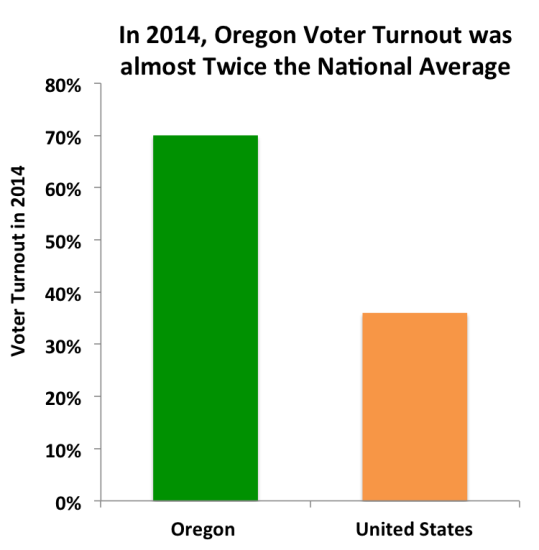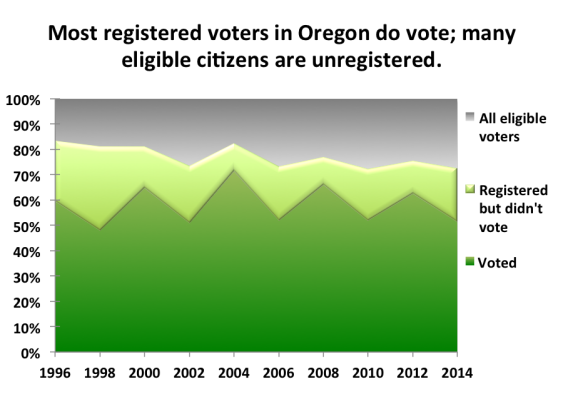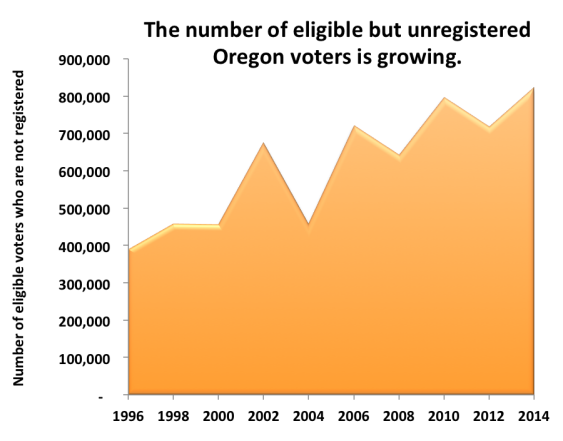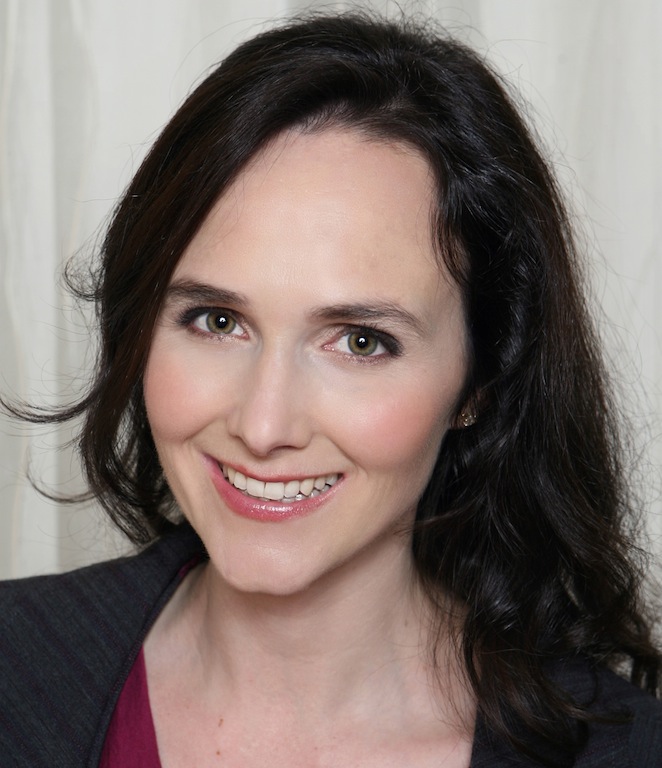Editor’s note October 2016: Did you know the Portland area has experienced a double-digit boom in the percentages of people registered to vote in the upcoming presidential election? This increase is thanks to the implementation of the Oregon Motor Voter Law, a program that automatically registers eligible voters. We’re bringing back this popular post to highlight how this law was enacted and how Oregon’s continued leadership in voting rights can inspire other Cascadian states and beyond.
Oregon just passed a law that will cause the state to treat its citizens as if they have a right to vote! Wait, you say, don’t all American citizens already have the right to vote? Well, no. Unlike in Canada, the US Constitution implies, but does not enumerate, the right to vote. And while American courts fiercely protect the right to free speech, scrutinizing and striking down attempts to put any barriers or restrictions on that right, the same is not true of voting. States can and do throw barriers in the paths of citizens trying to vote. In 2011 and 2012, 19 states passed 27 laws placing restrictions on citizens trying to vote. Imagine if states mounted that kind of attack on free speech!
Two main chokepoints can make it easy or difficult for citizens to vote: 1) registering to vote, and 2) actually voting. More than a decade ago, Oregon tackled the second chokepoint: Oregon is one of only 3 states to mail ballots to every registered voter. Vote-by-mail means Oregonians don’t have to choose between voting and losing their jobs, and they don’t have to stand in line for 10 hours (for an iPhone? If that’s your thing. To exercise what should be a basic right? Please!) Now Oregon consistently has the highest or one of the highest voter turnout rates in the country—Oregon turned out almost 70 percent of registered voters in 2014, compared to just 36.4 percent across the United States.

Original Sightline Institute graphic, available under our free use policy.
But voter turnout is only part of the equation. Even with 70 percent voter turnout, only about 50 percent of all eligible voters in Oregon actually vote. The lower overall turnout is because of the first chokepoint: registering to vote. More than a quarter of eligible voters in Oregon are not registered.

Original Sightline Institute graphic, available under our free use policy.
Oregon has been very successful at lowering the barrier to actually voting, but it has seen a growing problem with registering voters. In 2014, more than 800,000 eligible voters (out of about 2,200,000 eligible citizens) in Oregon were not registered. Oregon launched an attack on registration barriers by becoming one of the first states to create an online voter registration system, and by joining the Electronic Registration Information Center, a service for improving the accuracy of voter rolls and increasing eligible citizens’ access to voter registration. But still, the number of unregistered Oregon voters keeps trending upward.

Original Sightline Institute graphic, available under our free use policy.
That is about to change: Oregon just passed a first-of-its-kind law to automatically register eligible voters. (First in the United States. Canada already has universal registration.) The New Motor Voter Law requires the Department of Motor Vehicles (DMV) to digitally share its records for eligible voters with the Secretary of State. The Secretary of State will notify new voters and give them the opportunity to declare a party affiliation or to opt out of registration. As a result, Oregon will start to make a dent in those 800,000 unregistered eligible voters: the DMV estimates it will add about 300,000 voters to the rolls by 2017.
Seamless digital transfer of information from the DMV to the Secretary of State is a practice recommended by the bipartisan Commission on Election Administration because it saves time and money and reduces errors. Currently, citizens who have already filled out their information at the DMV and also want to register to vote need to get an additional paper form and fill it out by hand. A county employee then has to process that piece of paper and type the information into the voter database. This extra step creates unnecessary work and opportunities for mistakes in the voter record. Paper records are five times more likely than digital records to contain errors. Fewer errors in the voter rolls also mean less risk of voter fraud.
Saving money, reducing government administrative burden, and cutting the risk of voter fraud . . . Republicans must love this bill, right? No. The vote was strictly along party lines. (Democrats favored voter rights; Republicans opposed). Republicans said they voted no in order to protect individual privacy and because it is better for legislators to personally help register people to vote by carrying registration cards with them and instructing people how to register.
But at least one conservative, Linn County Clerk Steve Druckenmiller, spoke up for the right to vote. He said that it is wrong to put unnecessary barriers in the way of voting, including clunky registration processes. Druckenmiller said: “People went and died for my right to vote. They didn’t die for my right to register to vote.”
Amen.









Jon Morgan
Voter registration seems anachronistic. North Dakota doesn’t have any. It should be automatic (Australia does this too) or abolished. Or at the very least, available on Election Day at voting locations, as in MN, MT, DC, and others.
There are lots of other good things we can do to increase turnout like limiting the number of elections each year and the number of items on each ballot. Ohio still elects county coroners. South Carolina elects the head of the National Guard. This is confusing nonsense. As John Oliver recently pointed out, electing judges is an inherent conflict of interest. Let’s stop it.
We could also make Election Day a federal holiday so most people get the day off work. Even on a philosophical basis, doesn’t the notion that we elect our own officials make us a democracy more than our “independence” from a long-dead empire?
We also need more public confidence in the system, which includes reducing corruption, improving civics education, and actually enforcing the “public interest” requirement in the Communications Act–our media coverage of public affairs is pretty poor and mostly increases cynicism. We obviously need to overturn Citizens United, but also Buckley v. Valeo (1976) so that 1) corporations aren’t people, 2) money isn’t speech, and 3) we can enact MANDATORY public financing. People will bother to vote when they have reason to believe their vote matters and makes a difference, rather than correctly thinking that corporations own the whole system, and politicians only care about the super-rich. Replacing outdated, duplicative bicameral legislatures with unicameral ones, and using proportional representation, would also simplify things and better represent more people while adding nuance to debates we stupidly cast as black and white. In Seattle, I have 6 politicians representing me at the state and federal levels. In Montreal, I had 2. WA is especially well-positioned for a unicameral PR legislature since we elect all our state legislators from one set of districts. Keep them, and elect 49 by district and 98 by party (or vice-versa) to a unicameral 147-seat legislature.
Kristin Eberhard
Jon – I completely agree and I will be writing about proportional representation in the future!
Jim
Yes election day should be a holiday, and campaigning should be limitd — e.g., to the 2 months prior to the election.
OMahoney
Can we eliminate the Electoral College as well? Then every vote counts and we can all stop listening to the hysterical IOWA coverage.
Kristin Eberhard
There is a movement afoot to make the Electoral College irrelevant through state action (since amending the Constitution to eliminate it would be so difficult).
Washington already signed on and Oregon may be the next. Stay tuned for an article.